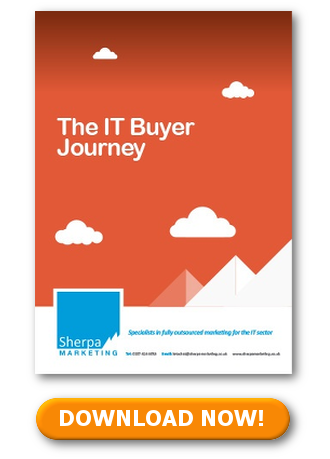
If you’re simply blogging and posting on social media without a clear strategy, you’re wasting time. Plus, you miss out on serious opportunities. Let’s learn how to focus and get the most out of your inbound IT marketing.
Supercharge your inbound IT marketing. Call Sherpa Marketing at 0207 416 6056 or contact us here.
Step 1: Identify Your Audience
Audience definition should be as precise as possible. For example, let’s say you sell human relations software. Drill it down as accurately as possible in terms of sector, location, size, revenue, etc.
Step 2: Locate Where Your Audience Lurks
Where does your target audience hang out online? What are the main industry websites? How about blogs, forums, and social media? All these areas are where you want to be visible. This is much more productive instead of just posting and hoping to get noticed.
Don’t forget to look for industry specific social media. LinkedIn also may have user groups that converse about your brand’s issues. Compile a list of all the places your audience spends time.
Step 3: Identify Pressure Points
While seeking where your audience lives, also look at what’s popular on those sites. What do people want to know? What causes them joy or pain?
You can also tap into your own sales and technical teams to find out what customers complain about. These issues become topics for future content strategically placed in places where potential clients congregate.
Step 4: Establish A Content Calendar
Success loves preparation. So schedule your content. If you’re posting blogs, for example, decide how many per week or month. Write the titles down (you can change them later if needed). Consider seasonal titles if it fits your brand. You can schedule social media postings as well. And when you set the schedule, stick to it.
Step 5: Promote Content
Now that you’re populating your blog with relevant content, you want to share it. Remember that list of audience hang-outs? That’s where you now go back to engage with your audience. Of course, don’t be embarrassed to reference your own content in comments or tweets.
As the above process unfolds, develop ancillary plans and material that further grease the machine. For example, prepare white papers or ebooks as free downloads (in exchange for an email) to help build a mailing list. Then set up email campaigns that guide each lead along the sales funnel. Focus it all around the goal of cultivating high quality leads, for example, those that request a sales demo.
Conclusion
A well planned inbound IT marketing strategy will get you results you want. Don’t believe it? Well we guarantee it.
Call Sherpa Marketing at 0207 416 6056 or contact us here.
post by topic
- ABM (31)
- Sherpa News (28)
- News (27)
- Demand Generation (20)
- Online Marketing (18)
- Inbound Marketing for Technology Companies (15)
- Channel Marketing (13)
- Content Marketing Strategy (12)
- Channel Transformation (11)
- sales and marketing alignment (11)
- Blended Sales & Marketing (9)
- Lead Follow-Up (9)
- Lead Management (8)
- Social Media (8)
- personalisation (8)
- Customer Relationship Management (CRM) (7)
- Lead Scoring (7)
- Martech (6)
- Buyers' Journey (5)
- Technology Marketing (5)
- Optimisation (4)
- email (4)
- Resellers (3)
- SEO (3)
- The IT Marketing Agency (3)
- channel agency (3)
- video (3)
- CSR (2)
- Charity Events (2)
- PX (2)
- Partner Experience (2)
- Team (2)
- Website Data (2)
- Data (1)
- Events (1)
- Harvard Business Review (1)
- birthday (1)
- customer experience (1)
- hubspot (1)
- marketing automation (1)





.png)
.png)
